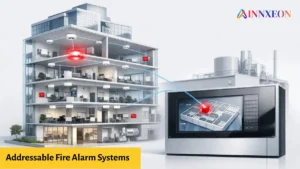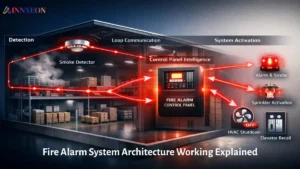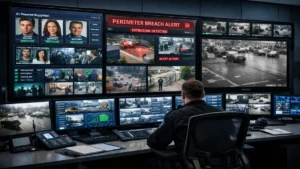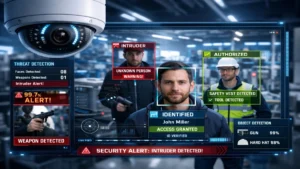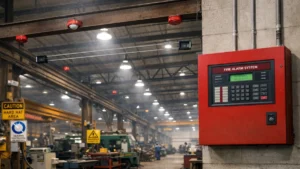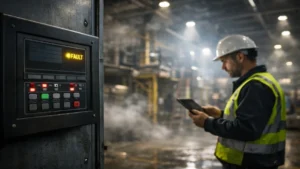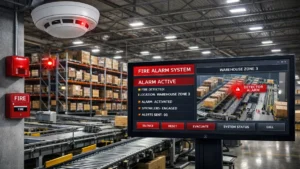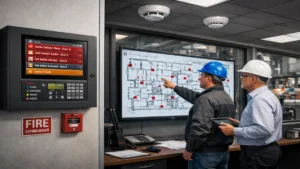When a major building gets designed in India, be it a hospital, airport, mall, IT campus or industrial facility, many decisions shape the outcome. But one decision carries more responsibility than most – The fire alarm system.
It is not chosen on appearance, marketing claims or catalog features. It is selected on technical reliability, audit compliance and the ability to perform when lives depend on it. That decision is almost always shaped by an MEP consultant.
MEP consultants don’t get the luxury of guessing. Their approvals must survive site conditions, safety audits, facility managers, fire NOC verification, real-world emergencies and long operational lifecycles. This is why their vendor lists are short, strict and dominated by trusted names.
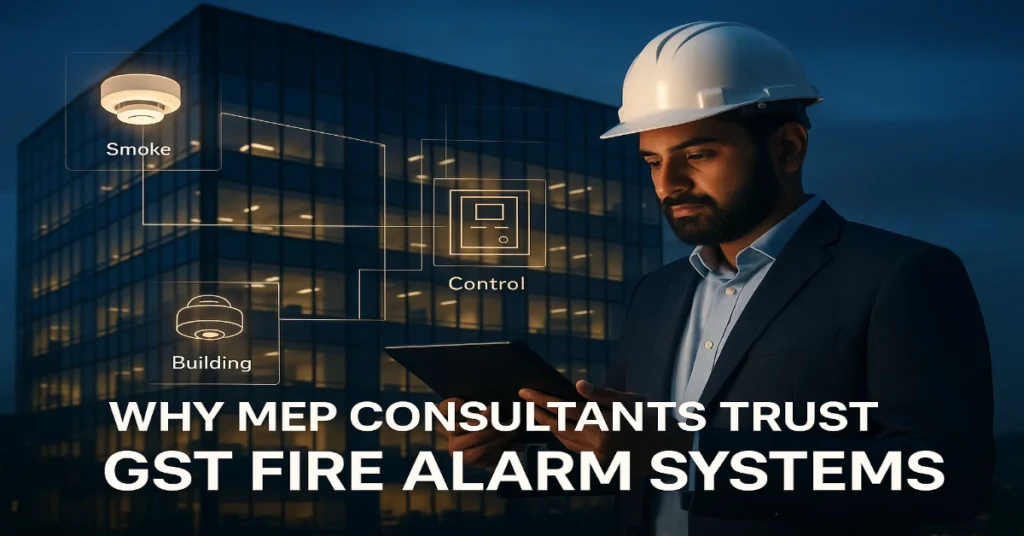
In India, one name appears repeatedly across major MEP recommendation sheets – GST (Gulf Security Technology).
This is not brand bias. This is outcome-based engineering trust.
The MEP Mindset: Zero Tolerance for Failure
To understand why GST earns consistent preference, it helps to understand how MEP consultants think.
They do not see a fire alarm system as a device ecosystem with sensors, panels and sirens. They see it as a risk prevention chain. If one link breaks, early detection fails, communication lags, false alarms spike, networks drop, or integration collapses, the entire building safety strategy fails.
They prioritize answers to questions like:
- Will the system survive Indian weather, power fluctuation, and dust?
- Will it detect early without triggering false panic?
- Will authorities approve it without objections?
- Can it connect with automation systems during emergencies?
- Will maintenance teams struggle with it after handover?
- Will it scale if the building expands in the future?
- Can we still get parts and service support after 8–10 years?
GST consistently answers yes to these questions in real deployments. That is why trust exists.
Design Built for India, Not Just Imported to India
Many global fire alarm brands arrive in India built for stable weather, conditioned environments and high electrical quality. But India’s real building conditions are rarely ideal.
Panels run in basements where humidity peaks. Devices install in hospitals that never shut down. Cables route through congested shafts with electrical noise. Coastal projects introduce corrosion risk. Industrial sites spread dust constantly. Tier-2 cities deal with voltage instability and grounding irregularities.
MEP consultants need a system that survives these conditions without becoming a maintenance headache. GST systems are engineered with protected loop circuits, stable communication protocols, filtered power architecture and surge tolerance. This makes them reliable in environments where other systems often collapse into false alarms, loop faults or unexplained glitches.
This resilience is not an add-on feature. It is the foundational reason consultants feel safe signing off GST in critical infrastructure projects.
Compliance That Passes Audits, Every Time
Fire safety approvals in India involve multiple checkpoints. A system might work perfectly on site, but if it fails compliance paperwork or standard alignment, approval collapses.
GST consistently aligns with:
- EN 54 certification (globally recognized standard for fire detection and alarms)
- National Building Code (NBC) requirements
- IS 2189 fire detection guidelines
- TAC expectations for insurance and safety reviews
- Integration norms for enterprise safety ecosystems
For MEP consultants, compliance is not theoretical, it is procedural. If a fire panel passes every technical test but raises questions in audit rooms, it costs time, redesign and reputation. GST passes these rooms quietly, which is why consultants recommend it proactively instead of defensively.
The Unseen Advantage: Scalability Without Redesign
India’s construction industry evolves while projects are still running. Building sizes expand. Additional blocks get approved. Parking levels increase. Command centers centralize. Data requirements multiply.
Some fire systems become a bottleneck when plans change. They force panel replacements, loop redesigns or additional hardware layers that disrupt architecture and add cost.
GST was built for expansion. It supports large loop capacity, multi-panel networking, campus-level integration and future system scaling without major redesign. This is especially relevant for developers building IT parks, universities, hospital chains, airports and industrial clusters where one project grows into many.
Consultants choose GST because it adapts to the project, instead of forcing the project to adapt to the system.
Integration Is No Longer Optional, It Is Expected
Modern buildings don’t run on isolated systems. They operate as connected intelligence networks where fire detection must communicate with the entire building during an emergency.
A fire event triggers:
- HVAC shutdown or smoke mode activation
- Lift grounding and rescue mode
- Door release for evacuation
- Public address system alerts
- CCTV event tagging
- BMS central command visibility
- Fire damper and suppression system responses
GST supports these workflows using open integration paths such as Modbus, BACnet gateways, TCP/IP networking and RS-485 communication modules. This allows it to plug into modern building automation layers without friction.
For an MEP consultant, integration capability is not a convenience, it is a mandatory requirement.
Low Fault Rate, Low Panic Rate, Low Maintenance Rate
False alarms are not minor inconveniences. They disrupt hospitals, evacuate offices unnecessarily, halt industrial workflows and damage everyday trust in the alarm system.
Systems that trigger false alarms frequently create:
- Alarm desensitization in occupants
- Higher AMC costs
- Frequent service dependency
- System bypass requests from facilities
- Reputation risk for consultants
GST delivers stable, intelligent detection that reduces false escalation while keeping sensitivity accurate for real threats. It also includes self-diagnostic reporting, clear fault mapping and device-level identification, allowing faster troubleshooting without trial-and-error checks across floors.
This translates into a fire safety system that people rely on instead of ignore, and a system that technicians can service without frustration.
Support Ecosystem That Matches India’s Pace
Specification means nothing without execution. MEP approval also depends on the answer to a practical question: Can this brand actually support India on the ground?
GST stands strong because it has:
- Multi-city distributor networks
- Readily available spares
- Trained system integrator partners
- Pre-sales design support
- On-site commissioning guidance
- Local technical assistance
- Reduced lead times for project supply
Consultants do not just select products. They select ecosystems. GST provides one that aligns with India’s execution challenges.
Cost That Makes Commercial Sense Without Compromising Safety
Indian markets often push projects toward two extremes: premium imported systems that strain budgets or low-cost alternatives that strain operations.
GST sits where MEP consultants want it:
- More economical than high-end global brands
- More reliable than untested low-cost alternatives
- Lower operational cost over 7–10 years
- Better Mean Time Between Failures (MTBF)
- Higher long-term value than short-term savings
This balance protects both safety and business logic.
Adoption That Proves Itself in Real Landmarks
GST is not building theoretical trust. It has already earned real trust. It operates inside critical environments including transportation hubs, hospitals, large commercial campuses, retail chains, industrial warehouses, hospitality properties and enterprise offices where failure is not an option.
When consultants see repeated success in demanding environments, recommendations become natural, not negotiated.
What This Trust Ultimately Means
At the drawing board, MEP consultants don’t choose systems that look advanced. They choose systems that stay advanced for their entire lifespan.
GST represents a promise that resonates with professional consultants:
- A system that detects early
- Communicates reliably
- Integrates cleanly
- Scales intelligently
- Maintains easily
- Complies automatically
- Serves consistently
That promise is why GST systems appear in design after design, not because they are marketed well, but because they behave well in the real world.
Read Also: How GST Sounder & Strobe Modules Improve Evacuation Efficiency
Read Also: GST Fire Alarm Certification, Standards & Approvals Explained for Buyers

